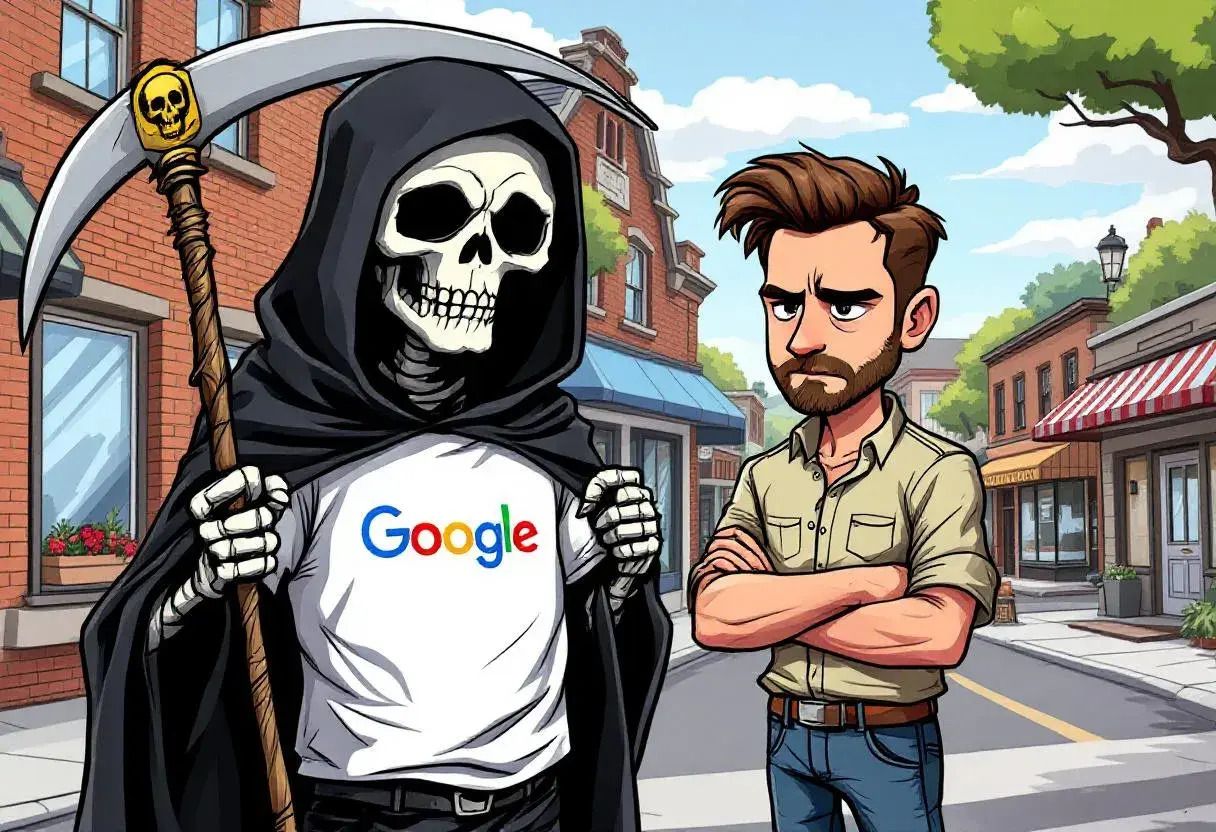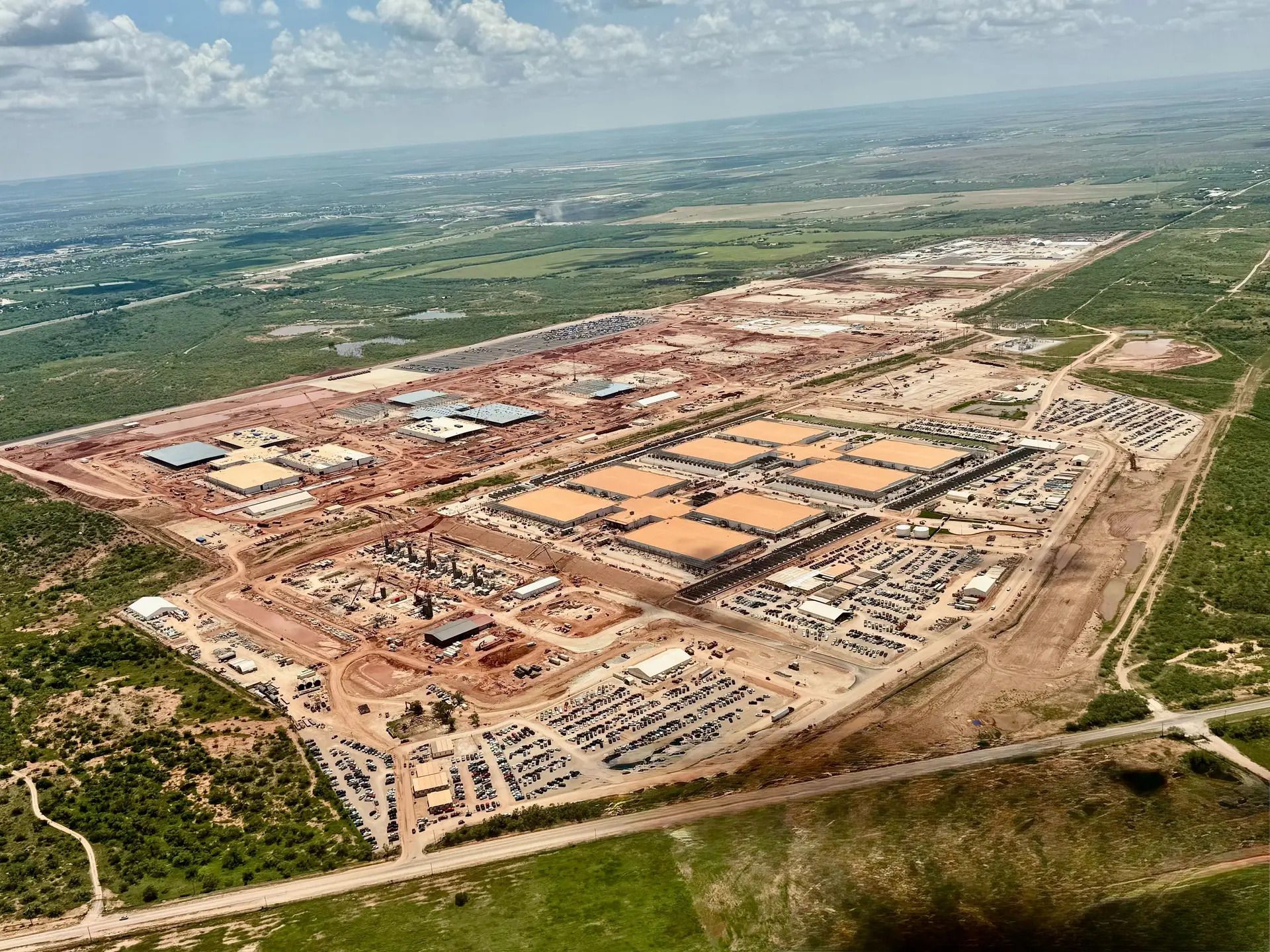- H4CKER BY NATHAN BINFORD
- Posts
- THIS WEEK: GOOGLE APOCALYPSE FOR LOCAL BIZ
THIS WEEK: GOOGLE APOCALYPSE FOR LOCAL BIZ
The writing is on the wall, Google's coming after local SEO...

🌟 Editor's Note
Welcome to the first edition of the H4CKER newsletter! This week learn how Google’s coming after local businesses, how I got ChatGPT to do my monthly marketing reports, plus all the most important news in AI and marketing.
Want to learn more about how AI and automation can help automate your sales pipeline and drive more revenue? Grab some time on my calendar for a quick chat.
🔍 Google’s Coming After Local SMBs For More Ad Dollars
The June Core Update from Google rocked the SEO world with some small reversals that brought traffic to the sites impacted by 2023’s Helpful Content Update (HCU) which jettisoned millions websites from search results and destroyed business around the globe.
But this algorithm update also caused a lot of volatility for other categories, like local SMBs. Since these changes affect a lot of my clients I’ve been paying very close attention.
In this 1st edition of H4CKER I’m going to dive into the details of these changes, how they affect local businesses, and what to do.
👎 Big Changes To Local SEO
In a move that benefits their zero-click strategy to fill the search results pages (SERPs) with their own widgets and ads, Google has altered local SERPs to prioritize websites tied to Google Business Profiles (GBPs) and reviews on GBPs and on other major sites like Yelp.
Given the sudden and harsh drop of a couple of my clients who still refuse to verify their service area GBPs, I strongly suspect that verification is really no longer optional.
Here are the other takeaways I’ve been able to piece together about this most recent (June) Core Update:
E-E-A-T signals now heavily prioritized (Experience, Expertise, Authoritativeness, Trustworthiness).
Penalization of generic, duplicate, and low-quality content.
Location-specific insights now essential in content.
Structured data (schema markup) critical for AI Overview visibility.
Internal linking and logical site architecture now impact local rankings.
AI-generated Q&A responses from GBP, reviews, and website data
Improved review moderation tools with faster Google response times
NAP consistency more important than ever
Volatility in Map Pack (businesses appear/disappear frequently).
Local key ranking factors now include:
Relevance (profile-query match),
Distance (even tighter hyperlocal proximity),
Prominence (review volume and quality).
📣 Google Changes Local SEO Policies
On July 15th, Barry Schwartz (@rustybrick) published an article on SearchEngineLand about Google updating their local search policies and those changes seem to reinforce the importance of GBPs, reviews, and hyperlocal proximity as well.
Here’s a screenshot of the updated policy doc:

It’s right there in the wording… “Relevance is how well a Business Profile matches what someone is searching for.”
Notice it doesn’t say, “how well a website matches what someone is searching for.” I think that’s pretty telling…
What To Do If You Lost Rankings In The June Core Update
First of all, it may just be too early to tell. So before you drastically rework your website to feature EEAT signals on every page, I recommend giving it a month or two to settle down while you update your approach.
Verified GBPs are now effectively required for local SEO
Sites need to load very quickly on mobile
Stop wasting money on local quality citations
Create clusters of posts on related topics that fulfill query fan-outs
Fill out thin content and add location-specific entities
Increase presence on popular platforms
Remember, this happens from time to time. Pick yourself up, dust yourself off, and get back to ranking.
⚙️ The Laboratory: Prompts & Automations
This week I’m preparing to do reporting for my clients and I’ve been meaning to automate more of the process using AI, so preparing the newsletter was a great excuse.
Problem: I want to export lead form data from a client’s website and extract some takeaways for the marketing report I’m about to send my client. And I don’t want to do any of the work…
Solution: Upload the lead form data into ChatGPT o3 and prompt it to analyze the results, calculate specific metrics, and glean takeaways.
Find out how AI can help your streamline and scale your business, cut costs, and drive more revenue -schedule a free audit today!
🚀 AI / Marketing News
Google Ads Forces AI Adoption by Moving Brand Settings into AI Max Panel

Google has changed their Google Ads platform, moving brand inclusions and exclusions into its AI Max framework for new Search campaigns.
Source: SearchEngineLand
Takeaways:
Brand inclusions and exclusions now live only inside Google's AI Max panel
New Search campaigns must have AI Max enabled to access brand lists
Effectively forces advertisers to opt into AI automation
Brand settings are now integrated into the broader automation framework
My Take:
Google’s latest sleight of hand quietly nudges (read: shoves) advertisers into enabling its AI Max system if they want to maintain any sort of control over brand targeting.
This is Google dangling the cheese: Want to avoid showing your brand next to garbage content? Ok, but only if you let the robots drive… It's a classic bait-and-switch wrapped in AI fairy dust: hand over your keys to see the map. And it’s not necessary.
Ask yourself: if it was any good, would they have to shove it down our throats?
If you're not already optimizing manually, it might help, maybe. But for those of us who actually care where our ads run, it's another sign that self-driving campaigns mean less control for advertisers.
Google’s June 2025 Core Update Shakes Up The SERPs

The SERPs have been a rollercoaster for more than just local SMBs. Here’s what everyone is reporting from the front lines.
Source: SearchEngineLand
Takeaways:
Update ran from June 30 to July 17 and was the most volatile in recent years
Some sites impacted by the September 2023 HCU saw partial recoveries
Similarweb saw volatility spikes in top 5 rankings, and the health vertical
Sistrix and Semrush reported over 16% of top 10 results were new additions
Semrush showed that AI Overviews now appear in ~15–20% of queries
Health and retail sectors were most impacted
Ecommerce brands saw visibility boosts on broader product keywords
Mozcast, Algoroo, Accuranker, and others confirm continuing volatility
My Take:
Google just dropped a nuke on the SERPs with the June 2025 core update, and the fallout is as brutal as you’d expect.
If you were lucky, your site rose from the ashes of the September 2023 Helpful Content Update; if not, well… Google’s advice boils down to: 'Make better stuff and pray for the next algo cycle.'
Plus the update stirred the pot across verticals, with health and retail sectors especially shaken.
AI Overviews notably doubled in SERP presence.
Sam Altman Warns AI Will Erase Job Sectors, Demand National Security Updates, and OpenAI Should Lead the Way

Sam Altman is well known for hyping AI beyond the technology’s current realities, but it is becoming increasingly clear that it’s not so much AGI / ASI that we have to fear, Terminator-style, but bad human actors with AI tools.
Sam’s solution, of course, is that OpenAI should lead the way in solving these problems (that they’re creating)…
Source: ArtificialIntelligenceNews
Takeaways:
Sam Altman warned that AI will eliminate jobs in sectors like customer support
Altman claimed ChatGPT provides better medical diagnoses than most doctors
Altman also predicted threats from hostile nations using AI and voice fraud
Political shifts favor acceleration of AI under hawkish leaders focused on China
OpenAI opening a Washington office to position itself as the path to acceleration
My Take:
Altman’s Washington cameo was equal parts prophecy and pitch: AI will disrupt everything from call centers to hospitals, threaten financial systems, and clone your voice; but don’t worry, OpenAI will save us from itself.
He paints a picture of total job loss, then describes a utopia powered by flawless AI agents. It’s typical Sama-ganda (Sam goes by @sama on X) where the future is a utopia as long as he’s in control.
Meanwhile, timely comments from folks like Jitterbit’s CTO remind us it’s not actually killer robots that we should fear, but clueless execs automating without thinking.
Yes, AI is eating the world. There’s no denying that; but you don’t have to give it the whole buffet. Just start with what’s useful and keeps your margins fat, and don’t worry about the hype (unless you’re in customer service).
1,200 Experiments, AI Agents, and Deep Entity Mapping Reveal Where Google Goes From Here

Research from Olivier de Segonzac published at SearchEngineLand makes a compelling case for Google’s attempts at agentic search, fueled by many single-purposed agents, all trying very hard to answer your queries without allowing you to leave their turf.
Source: SearchEngineLand
Takeaways:
Google’s ~1,200 experiments confirm details from the 2024 leaks
Every domain (shopping, travel) has 'overlapping domains' for parallel testing
Entities (via the Knowledge Graph and Livegraph) evolve in real-time
AI Mode has 90+ specialized agents using COT and personalized context
Google profiles users to personalize Discover and other services
Query fan-out analyzes user intent and scores based on context and relevance
Takeaways: build a brand, keep content hyper-focused, and optimize for agents
My Take:
This inside scoop is the closest we’ll ever get to walking through Google HQ with glasses that let you see search working in real time.
Google's not just 'tweaking the algorithm', they’re A/B testing across the semantic multiverse and molding reality based on every bit of data you’ve ever given them.
The Knowledge Graph isn’t a helper tooltip anymore; it’s the spine of the whole hydra of AI-search.
The game now is branded entity validation, vectorized alignment, and being easy for AI to understand. If Google doesn't 'recognize' you, you might as well be invisible.
OpenAI and Oracle Go (Very) Big With New Stargate AI Data Center

The race is on for all the AI companies to produce their own computing power by building massive data centers. Grok had the first, the Stargate project has been gathering steam for a while now, and Meta recently joined the fray with its own massive data center project. Recent news from OpenAI and Oracle signals further investment in Stargate and it seems this race is only starting to heat up.
Source: ArtificalIntelligenceNews
Takeaways:
OpenAI and Oracle have teamed up to build massive AI data centers in the U.S.
The new facilities will collectively consume 4.5 gigawatts of power
Phase 1 is underway in Abilene, TX, with truckloads of Nvidia chips on the way
OpenAI's total data center power draw now exceeds 5 gigawatts
This is part of OpenAI’s pledge of $500 billion in U.S. AI infrastructure
Over 100,000 new jobs are expected to be created
SoftBank is redesigning AI data centers while Microsoft provides the cloud
This massively scales the hardware required for next-gen AI models and agents
My Take:
Massive doesn’t even begin to cover it. OpenAI’s teaming up with Oracle on data centers that eat cities worth of electricity just to feed the AI beast.
This isn't some theoretical moonshot. It’s concrete, cranes, and carbon footprints. For us marketers and business builders, this level of infrastructure means serious firepower is being readied for faster, cheaper, more capable AI agents.
Translation? You're about to get tools that make today's GPT-4 look like a Nokia flip phone; and the game’s gonna change again.
Stay frosty.
Nathan Binford
AI & Marketing Strategist
I hope you enjoyed this first edition of the newsletter. I may try some new things here and there as I fine tune the material, so please, tell me what you like and what you don’t, and how to make this newsletter more valuable to you.
And if you need help with AI, marketing, or automation, grab time on my calendar for a quick chat and I’ll do my best to help!